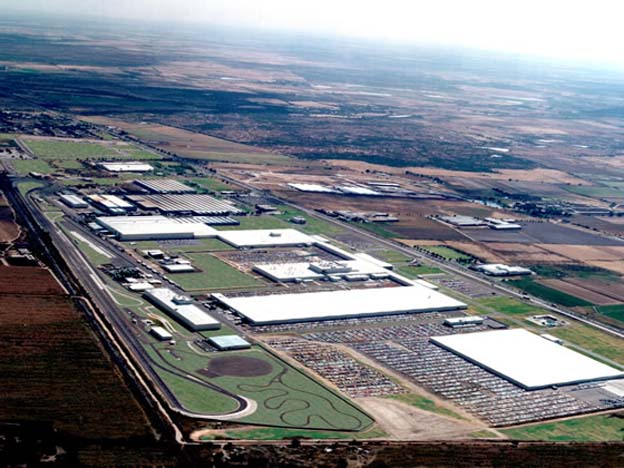
Newest Nissan plant in Mexico. Another is expected in Brazil as well. Photo Credit: Nissan
Recently, the general gloom about Mexico has been replaced by a bit of positive reportage. Mexico’s economy grew faster than Brazil’s last year, and it is set to do so again in 2012.
Largely, that’s because NAFTA is once again paying dividends for Mexico. Higher wages in China and volatile transport costs have made Mexico the most popular spot for “re-shoring,” i.e. manufacturing for North American consumers. Also, Mexico’s middle class is driving higher domestic demand.
All in, these changes are likely to create a new baseline for Mexican growth around 3.5-4 percent.
Here’s the rub: Mexico is a rare bright spot in the global economy in part because of America’s whop-jawed recovery. As President Obama recently noted on the campaign stump, US carmakers are on track to post their highest revenues since 2007. And Mexico is a direct beneficiary of Detroit’s rebound. Last year Mexico produced a record 14% of America’s new car fleet, bringing the country $23 billion in revenue.
Much of this owes to pent-up demand from people who tried to squeeze the last mile out of clunkers, as well as a desire for more fuel-efficient cars. But, as Rebecca Lindland, an analyst at HIS Automotive, told Bloomberg last week: “There’s a little bit of disconnect between what we’re seeing in the economy and what we’re seeing in the auto industry.” Eventually, US auto sales will fall back in line with overall US growth.
Second, Pemex has found reprieve in the shale gas boom. Natural gas prices are at record lows in North America because the US shale boom hasn’t been attended by a reworking of the country’s energy infrastructure so that the gas can be exported to Europe or across the Pacific. The gas can’t leave the continent. As a result, Mexico has been able to arbitrage its position by exporting crude oil at $90 a barrel while importing cheap natural gas from up north. This, too, will change sometime later this decade once America and Canada’s natural gas export infrastructure is finalized, and as Mexico becomes a wholesale energy importer due to Pemex’s declining oil output.
These perversions in the US market will surely be resolved. When they are, two of the factors behind Mexico’s growth will, absent reform, begin to constrain it.